|
|
|
Sort Order |
|
|
|
Items / Page
|
|
|
|
|
|
|
| Srl | Item |
| 1 |
ID:
125040


|
|
|
|
|
| Publication |
2013.
|
| Summary/Abstract |
Despite its relative absence from much of the literature on politics in the Pacific region, religiosity is an assumed and often unchallenged component of political life. Drawing from more than 100 in-depth biographical interviews with politicians, around 40 published life histories and other publicly available material, this article uses Pierre Bourdieu's concept of 'habitus' to explore how politicians see the role of faith and religious association contributing to their public profile, election campaigning, representative and legislative functions, and 'inner' life. It advances two arguments: firstly, that ideal analytic distinctions like state, society and religion become problematic in the Pacific Islands where political leaders tend to occupy multiple roles and assume overlapping identities; and, secondly, that despite the overwhelming religiosity seemingly apparent in public rhetoric, secularization is an effervescent narrative across the region with politicians vocal protagonists on all sides of this debate.
|
|
|
|
|
|
|
|
|
|
|
|
|
|
|
|
| 2 |
ID:
195458


|
|
|
|
|
| Summary/Abstract |
This article explores patterns of caste solidarity and religious practices among North Indian Dalits in Mumbai during the COVID-19 pandemic. Drawing from ethnographic data, it demonstrates how respondents experienced specific vulnerabilities due to their ethnic and caste identities. Following this, solidarities based on caste emerged to strengthen social cohesion and offer a sense of future possibilities. Additionally, on account of the ontological insecurity caused by the pandemic, a renewed collective sense of religiosity emerged, helping local people to manage their precarious existence and mitigating pain. The article concludes by arguing that community solidarity and religious re-assurance mechanisms, given the absence of state support, were their only hope to cope with the pandemic and to navigate COVID-19.
|
|
|
|
|
|
|
|
|
|
|
|
|
|
|
|
| 3 |
ID:
095676
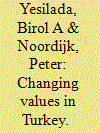

|
|
|
|
|
| Publication |
2010.
|
| Summary/Abstract |
Using data from the World Values Surveys, this study examines changing values in Turkey and shows that rising religiosity and intolerance can be traced back to 1995 and have become more visible during the AKP's rule. Moreover, Turks are found to be the most religious of all the societies compared in the study. Findings suggest that Turkish voters are likely to continue being attracted to political parties like the AKP in the future, which would have important implications for Turkey's relations with its traditional friends in the West.
|
|
|
|
|
|
|
|
|
|
|
|
|
|
|
|
| 4 |
ID:
185579
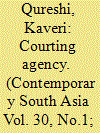

|
|
|
|
|
| Summary/Abstract |
Sharia councils have been in existence in England since the 1980s, providing advice and guidance in matters of Islamic family law. The vast majority of their users are women applying for Islamic divorces. The ulamā (scholars) at the councils encourage reconciliation and only grant divorces where this is deemed impossible. This paper, based on observations at a large sharia council in East London, supplements earlier institutional analyses by focusing not on what the ulamā are doing, but on what women are doing at the council. The paper identifies a spectrum of compliance with the council and its procedures, ranging between those who say they just want what the sharia wants, to foot-dragging, actively contesting the ulamā and exiting the council. Further, these forms of engagement may change over time. Overall, the paper contributes by illustrating the complexity of British South Asian Muslim women’s identities and affiliations and engaging with questions of gendered agency. It is clear that even when women petitioners contest, confront or exit the council, they may inscribe their moves within, rather than in opposition to, Islamic norms and values. The paper draws out the wider political implications of this non-opposition between Islamic subject positions and agency.
|
|
|
|
|
|
|
|
|
|
|
|
|
|
|
|
| 5 |
ID:
111897
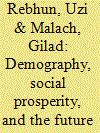

|
|
|
|
|
| Publication |
2012.
|
| Summary/Abstract |
The expanding recognition of the two-state solution for the Israeli-Palestinian conflict ostensibly removes an immediate demographic threat to Israel that the Arab inhabitants between the Mediterranean Sea and the Jordan River will soon outnumber the Jews. The demographic and social concern of maintaining the character of the State of Israel as the place where the Jewish people can realize their right to self-determination and can ensure a solid Jewish majority should be directed inward. Israel also wishes to continue to be a prosperous and developed country. This paper examines the changing proportions and characteristics of specific population subgroups and their effect on Israel's future as a Jewish and prosperous state. Further it argues that the demographic composition does not allow Israel to accept the demand for the 'right of return' whereas the two-state solution should involve the settlement of the Palestinian refugees in the new Palestinian state. The article discusses broader meanings of the demographic dimension for the Jewish and Arab populations in Israel.
|
|
|
|
|
|
|
|
|
|
|
|
|
|
|
|
| 6 |
ID:
113551
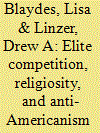

|
|
|
|
|
| Publication |
2012.
|
| Summary/Abstract |
The battle for public opinion in the Islamic world is an ongoing priority for U.S. diplomacy. The current debate over why many Muslims hold anti-American views revolves around whether they dislike fundamental aspects of American culture and government, or what Americans do in international affairs. We argue, instead, that Muslim anti-Americanism is predominantly a domestic, elite-led phenomenon that intensifies when there is greater competition between Islamist and secular-nationalist political factions within a country. Although more observant Muslims tend to be more anti-American, paradoxically the most anti-American countries are those in which Muslim populations are less religious overall, and thus more divided on the religious-secular issue dimension. We provide case study evidence consistent with this explanation, as well as a multilevel statistical analysis of public opinion data from nearly 13,000 Muslim respondents in 21 countries.
|
|
|
|
|
|
|
|
|
|
|
|
|
|
|
|
| 7 |
ID:
168801
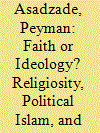

|
|
|
|
|
| Summary/Abstract |
The Middle East, particularly the Islamic Republic of Iran, has a reputation for harboring very strong forms of anti-Americanism. Why are some individuals more hostile to the United States than others? What factors are associated with anti-American sentiments? This article offers the first systematic study of anti-Americanism in Iran, a country in which anti-Americanism has been a guiding policy of the government since the 1979 revolution. Based on original survey data from 2016, I seek to explain how religiosity and political Islam influence public attitudes toward the United States. Distinguishing between political and cultural anti-Americanism, I find that, while support for political Islam is significantly associated with both types of anti-Americanism, religiosity predicts only cultural anti-Americanism. The findings challenge the literature that associates anti-American sentiments with religiosity in the Islamic world.
|
|
|
|
|
|
|
|
|
|
|
|
|
|
|
|
| 8 |
ID:
087761
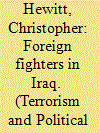

|
|
|
|
|
| Summary/Abstract |
Statistics on the national origin of almost one thousand killed and captured foreign fighters in Iraq reveal noticeable differences among Muslim majority countries in their jihadism rate (number of fighters/million population). These cross-national differences are used to test different theories as to the causes of Islamist extremism. The findings do not support those theories which see the cause of jihadism in the political and economic failures of Muslim societies, since the foreign fighters come from the more developed countries. The foreign fighters also come from the more religious societies, and from those societies "occupied" by U.S. or Israeli military forces.
|
|
|
|
|
|
|
|
|
|
|
|
|
|
|
|
| 9 |
ID:
154372
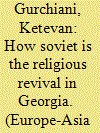

|
|
|
|
|
| Summary/Abstract |
This article explores everyday religiosity in post-Soviet Georgia based on multi-sited fieldwork and applying a genealogical approach. It looks at the use of tactics in negotiations between priests and believers. The article sees negotiations, prevalent in domestic religiosity and embodied practices, as a continuation of everyday Soviet tactics, particularly informal networks (Blat) and moonlighting (Khaltura). To understand how negotiations lead to greater control and an increase in religiosity, the article explores important features of the Georgian Orthodox Church and its specific development. The article concludes that tactics in this specific context strengthen the more powerful and reproduce dependency.
|
|
|
|
|
|
|
|
|
|
|
|
|
|
|
|
| 10 |
ID:
119599
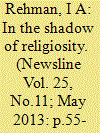

|
|
|
| 11 |
ID:
190091
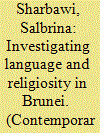

|
|
|
|
|
| Summary/Abstract |
The inexplicable link between the Malay language and Islam has been well-documented in Malaysia. In Brunei, however, this association has not been made explicit and could only be inferred through the state’s stance of utilising only the Malay language for Islamic-related matters, most conspicuously in the Islamic education curriculum. While this practice has been in place since the early days of Islamic education in the country, the changing linguistic situation in Brunei, where English is now more popular than Malay among the younger generation, may require some rethinking of this practice. An earlier study investigating the issues of language and religion in Brunei has found that those who are more English-inclined do not identify strongly with the Muslim identity as their Malay-leaning counterparts. Taking its cue from those findings, the present study extends the investigation in two ways: one, by adding the social variables age, gender and educational background in its analysis; and two, by focusing on the notion of religiosity rather than on religious identity alone. The findings show that age and language proclivity are both predictors of religiosity with older Bruneians displaying greater religiosity than the younger ones. Language also plays a factor such that those who are predisposed to using more English than Malay have fewer manifestations of practices aligned to the Islamic teaching. Gender and educational level, however, have low factor loadings and are not contributory to the measurement of religiosity.
|
|
|
|
|
|
|
|
|
|
|
|
|
|
|
|
| 12 |
ID:
171688
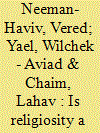

|
|
|
|
|
| Summary/Abstract |
This article seeks to examine the connection between religiosity and deviance, focusing on the phenomenon of risk behaviour among Jewish national-religious youth at-risk. The study was conducted by using interviews with 66 participants in six focus groups among teenagers and young people at-risk, normative youth and professionals. Analysis of the research findings revealed several main themes that touch upon the issue of religion as both a protecting and a risk factor for religious youths, beginning with the question of personal identity, and continue with the influence of social control and social labelling.
|
|
|
|
|
|
|
|
|
|
|
|
|
|
|
|
| 13 |
ID:
173458
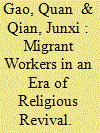

|
|
|
|
|
| Summary/Abstract |
In the reform era, China appears to be caught in a contradictory dual process – the entrenchment of secular values and simultaneously, the notable revival of all forms of religion. However, the existing literature has achieved limited success theorizing how the thriving of faiths constitutes, and co-evolves with, secular modernity and capitalism. This article contributes to this re-theorization by bringing migration, labour and industrial capitalism to bear on faith and religious practices. Our empirical study in Shenzhen focuses on the formation of rural-to-urban migrant workers’ Christian faith. We examine the ways in which migrant workers manoeuvre religion as a cultural, symbolic and discursive resource to come to terms with, but also sometimes to question and counteract, the double exploitation enforced by state regulation and labour relations. In the meantime, however, this article also argues that migrants’ efforts in self-transformation through the discourses of benfen and suzhi, and their theologically mediated interpretation of alienation, labour exploitation and social inequality, overlap with, and reinforce, the agenda of producing docile, productive bodies of migrants, an agenda endorsed by the state–capital coalition. This research opens new opportunities for theorizing how capitalist secularity and religious orientation implicate one another in the current Chinese society.
|
|
|
|
|
|
|
|
|
|
|
|
|
|
|
|
| 14 |
ID:
177942
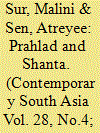

|
|
|
|
|
| Summary/Abstract |
This article explores the irreverent and supposedly irrational actions of two protagonists, Prahlad and Shanta, characters that the authors encountered during the course of their extended fieldwork in Kolkata. Prahlad is an Oriya migrant plumber who passionately seeks god at the cost of making money, and resists adhering to rational economic behaviour in the city. Shanta is a grieving mother who relentlessly seeks justice for her son’s disappearance during a revolutionary movement that consumed the majority of urban youth in the 1970s. Family, friends, neighbours and employers describe and at time dismiss rgen as pagla or insane. This article foregrounds these expressions of paglami or madness in Kolkata. We ask: how does close ethnographic attention to quotidian madness – its articulations, exploitations and resistances – enable us to rethink urban lives? We argue that dissension, alienation and ‘unreasonable fixations’ are affective thresholds of a changing city. They corroborate the ways in which the city’s transforming political landscape impinges on its ordinary lives.
|
|
|
|
|
|
|
|
|
|
|
|
|
|
|
|
| 15 |
ID:
092472
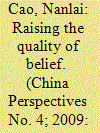

|
|
|
| 16 |
ID:
161864
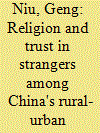

|
|
|
|
|
| Summary/Abstract |
During China's rapid urbanization, the social marginalization of its rural-urban migrants has attracted increasing scholarly and social attention. At the same time, China is experiencing a rising tide of religion, the impact of which on social integration remains unexplored. Based on a large-scale survey for rural-urban migrants, we find that being a religious believer is associated with a higher level of trust towards strangers. In addition, participating in religious-related activities has a positive impact on trust for both believers and non-believers. We test the robustness of our results using instrumental variable analysis. We conjecture that prosocial values in religious teaching and social interaction opportunities contribute to rural-urban migrants' generalized trust. Our results indicate that informal institution such as religion can be important in forming social capital for marginalized social groups.
|
|
|
|
|
|
|
|
|
|
|
|
|
|
|
|
| 17 |
ID:
139448


|
|
|
|
|
| Summary/Abstract |
Testing social movement theory positing that radical organizations are ideologically driven at their core, but are supported by civilians who are driven by social factors, this research interrogates the disparity between radical group ideology and supporter belief set in the context of present-day Nigeria. Content analysis of randomly selected Boko Haram publications establishes the high, and increasing, levels of religiosity exhibited by the violent social movement itself. In contrast, a large-N survey of Nigerians conducted in 2012 and 2013 shows that high levels of religiosity do not significantly predict willingness to justify violence, commitment to non-state violent actors, or positive attitude toward Boko Haram among Nigerians as a whole, but rather the opposite. Given these findings, Boko Haram may be better understood within the tradition of radical extremist movements across the ideological spectrum, even while it frames its struggle as that of a distinctly religious movement.
|
|
|
|
|
|
|
|
|
|
|
|
|
|
|
|
| 18 |
ID:
178930
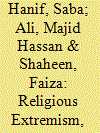

|
|
|
|
|
| Summary/Abstract |
The role of religious seminaries (madrassas) and mainstream schools in developing religious extremism and sympathy toward Taliban (the most dangerous militant group in Pakistan) has received little, if any, scholarly attention. This study has empirically investigated the role, if any, played by religious seminaries (madrassas) and mainstream schools in promoting religious extremism, and especially sympathy toward the Taliban. The study compared attitudes among secondary school students, on the one hand, and madrassa students, on the other, and found school type to be a strong predictor of religious extremism. On the whole, madrassa students tend to hold the most extreme views. However, an individual’s religiosity appears to increase the likelihood of them becoming a Taliban sympathizer, meaning that it is religiosity rather than school type that affects sympathy toward the Taliban. The findings of this study are in line with other recent research, namely that education amplifies frustrated ambitions among individuals who then find gratification in taking extremist attitudes and/or actions.
|
|
|
|
|
|
|
|
|
|
|
|
|
|
|
|
| 19 |
ID:
100586
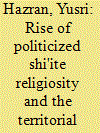

|
|
|
|
|
| Publication |
2010.
|
| Summary/Abstract |
The historical development, which might be called the "crystallization" of politicized Shi'ite religiosity, constitutes one of the major reasons behind the current crisis of the territorial state in Iraq and Lebanon. Having dominated Shi'ite political life since the 1970s, this phenomenon derived from a combination of various processes, primarily related to the territorial state and its political and ideological mechanisms. These processes established primordial local attachments as the principal tool for political change and empowerment.
|
|
|
|
|
|
|
|
|
|
|
|
|
|
|
|
| 20 |
ID:
175722
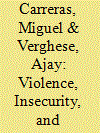

|
|
|
|
|
| Summary/Abstract |
A large social science literature demonstrates a link between personal insecurity and religiosity. When individuals are healthy, literate, and gainfully employed, they tend to be less religious. One of the most fundamental threats to an individual is the risk of violence, but this important marker of insecurity has been unexplored in recent studies of the determinants of religiosity. We use a unique dataset that measures state-sponsored terror, an ideal measure for studying insecurity, and explore the relationship between violence and religious beliefs and practices in 71 countries during the period 1981–2011. We find a robust positive association between violence and religiosity, and offer several reasons to believe that this is a causal relationship. Drawing on psychological studies, we argue that the specific mechanism at work deals with religious coping, a uniquely efficacious way of combating the stress and anxiety produced by the threat of recurrent violence.
|
|
|
|
|
|
|
|
|
|
|
|
|
|
|
|
|
|
|
|
|